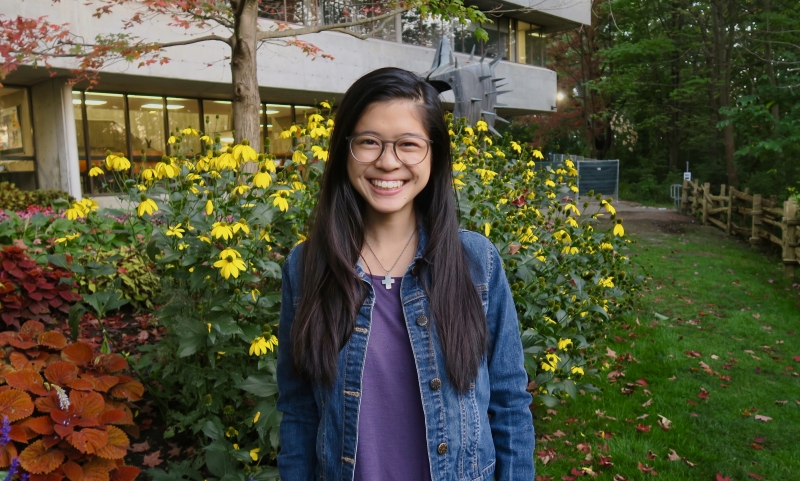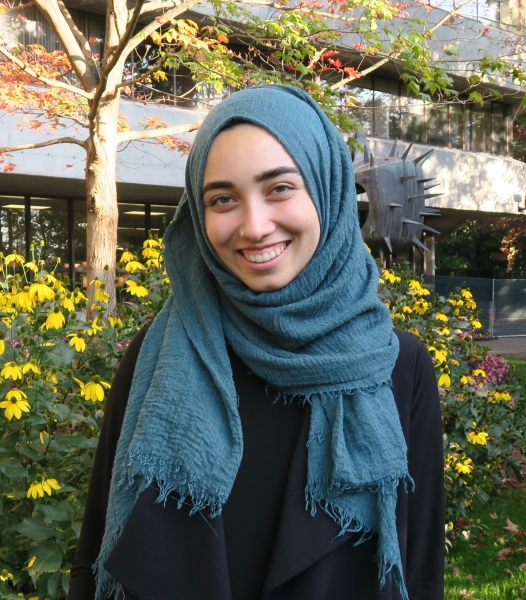The Centre for Critical Development Studies is pleased to award the 2020 Best Thesis Prize to Alyssa Esparaz and Sana Najafi. Read more about their work below.

Bio: Alyssa Esparaz completed her Honours Bachelor of Arts degree with a specialist in International Development Studies and minors in Anthropology and Political Science. Both personally and professionally, Alyssa is interested in the intersection of faith and development, and her thesis focuses on the relationship between Christian evangelicalism and international development. Alyssa is a passionate writer and communicator, and loves using her skills to inspire action and transformation. Throughout her time in university, Alyssa worked in advocacy and communications at Compassion Canada, including during her 12-month co-op placement. Looking ahead, she will be continuing in a communications role with Compassion Canada, and also hopes to further publish and share her research. In the future, she plans to pursue graduate studies in theology.
Thesis Title: Faithful Development? Examining the (Re)formative Tension at the Intersection of Evangelicalism and International Development
Thesis Abstract: The relationship between evangelicalism and international development is simultaneously rich and contentious—both currently and historically. Yet despite evangelicalism’s high levels of engagement with international development, this relationship is not often studied. This thesis examines the tensions and contradictions at the intersection of evangelicalism and international development through the lens of historical institutionalism, and considers how these tensions and contradictions might present opportunity for gradual change in the institution of evangelicalism, despite its strong path dependence. Surveys and interviews were conducted with Canadian-based staff of evangelical international development organizations in order to understand their beliefs and approaches to evangelical international development. This thesis argues that points of tension and contradiction within evangelicalism serve as spaces in which key agents have the opportunity to reform and reproduce the institution of evangelicalism. Many of these points of tension exist at the intersection of evangelicalism and international development, making evangelical international development an important space where gradual institutional change can be promoted within the structural constraints of evangelicalism. This thesis concludes there is opportunity for progressive change within evangelicalism in regard to critical development issues such as decolonization, gender equity and racial justice.

Bio: Sana recently completed her Bachelor of Arts as a specialist in International Development Studies and a double minor in Political Science and Anthropology. As part of her degree, she completed an 8-month placement in Nairobi, Kenya at the Aga Khan University where she served as a Communications Intern to the Networks of Quality Assurance & Teaching and Learning. During her time at UTSC, Sana was involved with various student clubs and activities, including Frontier College, International Development Conference and Amnesty International, as well as intramural soccer and basketball. She also worked at various student service offices including Department of Student Life, Centre for Teaching & Learning and Academic Advising & Career Centre. Throughout her degree she appreciated the breadth and intersectionality of the IDS program, and wanted to explore ways to apply these theories into practical strategies. To pursue this interest, she will begin studying at the University of Toronto Faculty of Law in August 2020 in the Juris Doctor program.
Thesis Title: Canadian Students’ Global South Placements: Ethical Dimensions and preparation
Thesis Abstract: Amidst a context of rapid internationalization, particularly in the higher-education industry, opportunities for international experience are becoming increasingly promoted and popularized. There is an emphasis to develop “global citizens” who will catalyze change and create meaningful cross-cultural connections. However, understanding the complexities involved when someone from the Global North enters a Global South space requires critical reflection and acknowledgement of power and privilege. This study used in-depth interviews with Canadian students who had long-term placements in the Global South to identify the ethical dilemmas they encountered, and the ways they navigated through them. Through a lens of ethical internationalization, this research aims to identify areas of opportunity and tools for universities and students alike to utilize, to better support reflexivity during their placements. As expectations for the higher education experience continue to change and grow, these findings remain pertinent to ensure solidarity-building and global development. Ultimately this research advocates for improved student preparation which provides well-rounded pre-departure training as well as guided reflections which students can utilize before, during and after their placement to unpack the various challenges and interactions they will face.